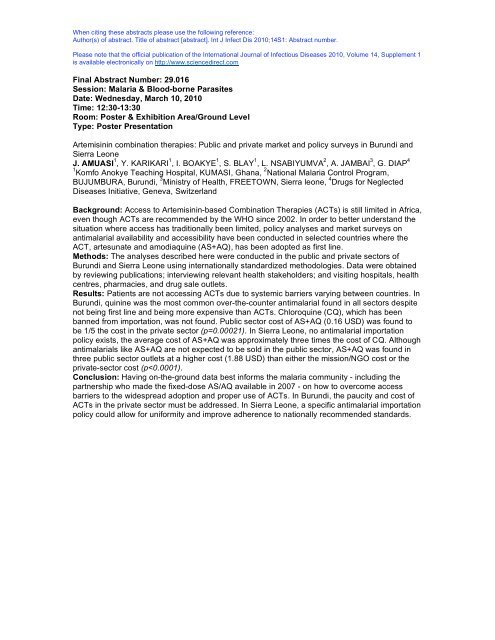14th ICID - Poster Abstracts - International Society for Infectious ...
14th ICID - Poster Abstracts - International Society for Infectious ...
14th ICID - Poster Abstracts - International Society for Infectious ...
Create successful ePaper yourself
Turn your PDF publications into a flip-book with our unique Google optimized e-Paper software.
When citing these abstracts please use the following reference:<br />
Author(s) of abstract. Title of abstract [abstract]. Int J Infect Dis 2010;14S1: Abstract number.<br />
Please note that the official publication of the <strong>International</strong> Journal of <strong>Infectious</strong> Diseases 2010, Volume 14, Supplement 1<br />
is available electronically on http://www.sciencedirect.com<br />
Final Abstract Number: 29.016<br />
Session: Malaria & Blood-borne Parasites<br />
Date: Wednesday, March 10, 2010<br />
Time: 12:30-13:30<br />
Room: <strong>Poster</strong> & Exhibition Area/Ground Level<br />
Type: <strong>Poster</strong> Presentation<br />
Artemisinin combination therapies: Public and private market and policy surveys in Burundi and<br />
Sierra Leone<br />
J. AMUASI 1 , Y. KARIKARI 1 , I. BOAKYE 1 , S. BLAY 1 , L. NSABIYUMVA 2 , A. JAMBAI 3 , G. DIAP 4<br />
1 Komfo Anokye Teaching Hospital, KUMASI, Ghana, 2 National Malaria Control Program,<br />
BUJUMBURA, Burundi, 3 Ministry of Health, FREETOWN, Sierra leone, 4 Drugs <strong>for</strong> Neglected<br />
Diseases Initiative, Geneva, Switzerland<br />
Background: Access to Artemisinin-based Combination Therapies (ACTs) is still limited in Africa,<br />
even though ACTs are recommended by the WHO since 2002. In order to better understand the<br />
situation where access has traditionally been limited, policy analyses and market surveys on<br />
antimalarial availability and accessibility have been conducted in selected countries where the<br />
ACT, artesunate and amodiaquine (AS+AQ), has been adopted as first line.<br />
Methods: The analyses described here were conducted in the public and private sectors of<br />
Burundi and Sierra Leone using internationally standardized methodologies. Data were obtained<br />
by reviewing publications; interviewing relevant health stakeholders; and visiting hospitals, health<br />
centres, pharmacies, and drug sale outlets.<br />
Results: Patients are not accessing ACTs due to systemic barriers varying between countries. In<br />
Burundi, quinine was the most common over-the-counter antimalarial found in all sectors despite<br />
not being first line and being more expensive than ACTs. Chloroquine (CQ), which has been<br />
banned from importation, was not found. Public sector cost of AS+AQ (0.16 USD) was found to<br />
be 1/5 the cost in the private sector (p=0.00021). In Sierra Leone, no antimalarial importation<br />
policy exists, the average cost of AS+AQ was approximately three times the cost of CQ. Although<br />
antimalarials like AS+AQ are not expected to be sold in the public sector, AS+AQ was found in<br />
three public sector outlets at a higher cost (1.88 USD) than either the mission/NGO cost or the<br />
private-sector cost (p
















